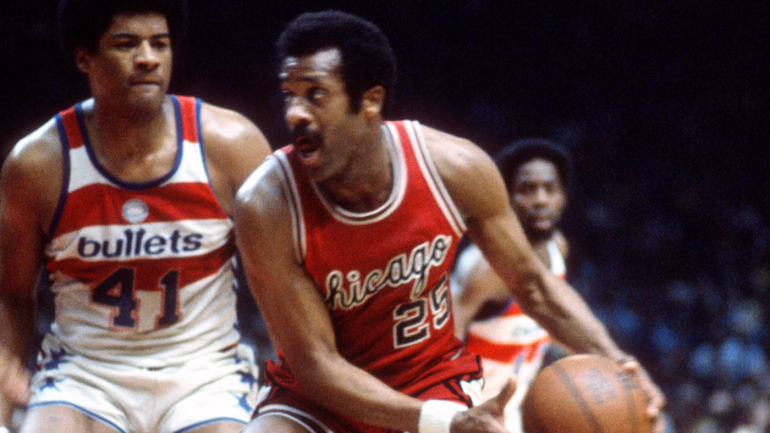
Chet Walker, a basketball Hall of Famer who made seven All-Star teams with the Philadelphia 76ers and Chicago Bulls, and won a championship in 1967, has died at 84 after a long-term battle with illness, the National Basketball Players Association announced on Saturday.
"Walker made a profound impact in our city and within our league," the Sixers said in a statement.
"His skill, dedication and contributions to the game made a lasting impact on the sport of basketball and the city of Chicago," the Bulls added. "Chet Walker will forever be remembered as a true Chicago Bulls icon."
Born on Feb. 22, 1940 in Bethlehem, Mississippi, Walker was the youngest of 10 children. He grew up in a house with no indoor plumbing or electricity, which he later described as "third world." When he was 10 years old, his mother moved the family to Benton Harbor, Michigan, after one of his sisters died of tuberculosis because a whites only hospital refused care.
In Michigan, Walker became a star at Benton Harbor High School. As a senior in 1958, he led the Tigers to the state championship game and a long-awaited showdown with Dave DuBusschere, who would also go on to a Hall of Fame career. Despite 25 points from Walker, Benton Harbor lost a heartbreaker, 71-68.
Following his prep career, Walker went to Bradley University in Peoria, Illinois, where he became a two-time first-team All-American, a three-time All-Missouri Valley Conference honoree and led the Braves to the 1960 NIT championship at a time when that event was just as prestigious as the NCAA Tournament. He averaged 24.4 points and 12.8 rebounds during his four seasons in Peoria, where he also earned his "Chet the Jet" nickname. He later had his No. 31 retired by the program.
In the 1962 NBA Draft, the Syracuse Nationals selected Walker with the No. 12 overall pick (at that time a second-round pick). Walker put together solid rookie season, which turned out to be the end of professional basketball in Syracuse. Shortly after the conclusion of the 1962-63 season, the Nationals were sold and relocated to Philadelphia, where they were re-named the 76ers.
It was in Philadelphia that Walker came into his own. He was an All-Star in three of his first four seasons with the Sixers, and proved to be a perfect fit alongside Wilt Chamberlain, who returned to the city during the 1964-65 campaign. Just a few years later, Walker and Chamberlain teamed up with Hal Greer and Billy Cunningham to lead the Sixers to their first title since being relocated, and still one of just two the franchise has won in Philadelphia.
During the 1967 playoffs, Walker averaged 21.7 points, 7.6 points and 2.1 assists per game, as the Sixers ended the Boston Celtics' reign of eight consecutive championships by defeating them in the Eastern Conference finals, then took down the San Francisco Warriors in the Finals. The 1967 Sixers are still regarded as one of the best teams of all time.
"He was slow -- you were slow, Chet -- but you just couldn't stop the man," Cunningham said when presenting Walker at his Hall of Fame induction in 2012. "He just took you to the spot on the court, faked you, went up over you, took it to the hole, or someone was open and he'd find the open man."
After two more productive seasons with the Sixers, both of which ended with playoff defeats to the Celtics, Walker was traded to the Chicago Bulls. Given a bigger role, Walker became one of the most consistent scorers in the league. During six seasons with the Bulls, he averaged 20.6 points on 48.3% shooting, made four All-Star appearances and led the Bulls to the playoffs every time. He also scored a career-high 56 points in 1972, which remained the Bulls' franchise record until Michael Jordan hit 57 in 1987.
While the Bulls never had much playoff success during Walker's tenure, he had a long-lasting impact on the franchise, which was in just its fourth year of existence when he came along.
"The sport hadn't made it in Chicago going back decades and they were again looking to move the team," Pat Williams, the Bulls' general manager during Walker's tenure told the New York Times decades later. "But when Chet got there, everything changed."
His legacy extended off the court as well. He was the Bulls' representative to the NBPA in 1970 and was a plaintiff in the anti-trust lawsuit filed by the players to challenge the planned merger between the NBA and ABA and the league's reserve clause, which tied players to one team. The suit was successful in delaying the merger until 1976 and granting the players free agency for the first time.
"The point was the lawsuit changed the structure of the NBA," Walker told veteran Chicago journalist Sam Smith years later. "The players started making more money, so the coaches made more money. It took away the sole power the owners had. The Robertson suit was the start of what made possible all the money that's made now. Larry Fleisher (players' attorney) never got the credit he deserved. Nobody talks about what those players did."
Walker, though, believed the settlement did not go far enough, and refused to support it. He filed a separate lawsuit against Bulls owner Arthur Wirtz and left the team over a salary dispute following the 1975-76 season. When told, through a statement from David Stern, who was then an attorney with the league, that he was "legally Bulls property," Walker walked away for good.
"I sat there reflecting on the word -- property," Walker wrote in his 1995 memoir. "Making $200,000 a year, I knew that millions of people would love to be in my shoes. Yet with Mr. Wirtz's claim to own me, I felt that two hundred years of my family's history in America had suddenly become real to me. I never said another word to him but turned and walked out the office door."
Following his retirement, Walker became a successful producer in Los Angeles. Most notably, his 1989 TV series, "A Mother's Courage," which was based on the life of Hall of Famer Isiah Thomas' mother, Mary, won an Emmy for Outstanding Children's Program. He was also a producer on Muhammad Ali's movie, "Freedom Road," and developed a friendship with the legendary boxer.
All told, Walker played 1,032 games over 13 seasons with the Nationals, Sixers and Bulls, and averaged 18.2 points, 7.1 rebounds and 2.1 assists. He was named to the 1963 All-Rookie team, made seven All-Star appearances and won one championship in 1967. He was inducted into the Naismith Memorial Basketball Hall of Fame in 2012, and was an inaugural member of the Bulls' Ring of Honor in 2023.
Regarded as a "first-class gentleman," by Jerry West, Walker will be remembered for forever changing the game, both on and off the court.






















